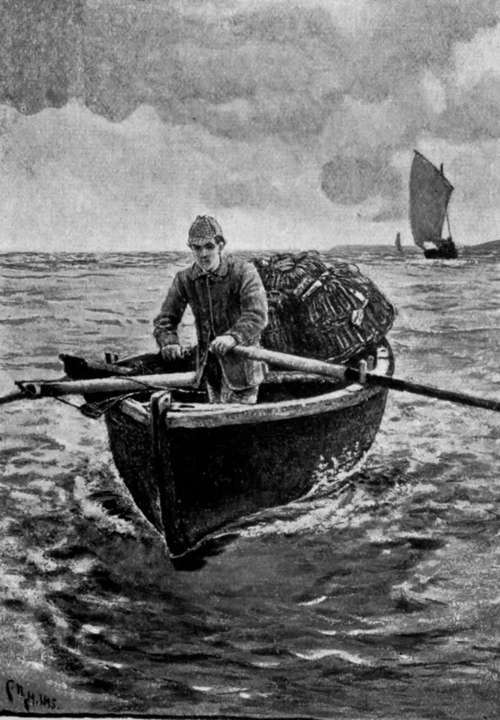The Quaint Little Hermit Crab
Description
This section is from the book "Sea Fishing", by John Bickerdyke. Also available from Amazon: Sea Fishing.
The Quaint Little Hermit Crab
The Quaint Little Hermit Crab, common enough in English waters, is certainly one of the most singular members of the family. Something has already been said about him in the Bait chapter. Nature having conferred upon him no decent covering for the greater portion of his body, he slips the end of his unclothed tail into any convenient shell, generally choosing that of a deceased whelk. Many a time have I pulled up my bait and found a pair of tiny pincers hanging on to it, the rest of the creature, four short legs excepted, being contained within an otherwise untenanted whelk shell. Put him down on the floorboards of the boat and watch him for a minute or two. For a time nothing will happen ; then the claws and the four legs slowly come out of the shell and begin a slow progress across the boat. Touch him ever so lightly and he retreats into his shell-house with a sharp snap like the steel fastening of a lady's bag.
From a zoologist's point of view the crab is a superior animal to the lobster because he has no tail to speak of. For the same reason a man is a superior animal to a monkey. The crab, unlike a man, is born with a tail, but in course of time shortens it, and tucks it away under his body. The lobster, on the other hand, retains his tail at some length until supper time. While the crab walks sideways, the lobster swims backwards, and having projecting eyes which work on universal joints, he can see round the corner with the greatest facility.
Many years ago lobster culture was attempted with more or less success in France ; and many millions of lobster eggs have been hatched in Newfoundland, Canada, Scotland, and other places. So far as figures go Newfoundland takes the lead, having in one year recently hatched seventy-five per cent, out of 152,600,000 eggs. Our own feeble little attempt in the lobster pond at Brodick, of 600,000 in one year, or a total of 27,160,000 since the hatchery was started, seems very trifling in comparison.

'LET US COME TO OUR OWN GOOD, HONEST, DUSKY-RED FELLOWS'.
Merely hatching lobsters presents no great difficulties ; slowly circulating sea water is required, and in due course the eggs hatch ; but the difficulty, which so far is, I believe, unsur-mounted, is to feed the little creatures after they have come into the world. At the present stage of our knowledge it is deemed best to turn them into the sea before they require artificial food. Not that they refuse to eat, for they are most voracious things, eating anything that is given them, and even one another, and many millions will die of indigestion if they are only given the opportunity. At that early age their enemies in the sea are so numerous that a very small percentage of the many millions which are hatched and turned in are likely to come to maturity. When the food difficulty has been overcome, and lobsters free of dyspepsia can be reared to the length of a few inches in ponds, we shall have some striking results.
Nearly akin to the lobster is the crawfish, a spiny, thorny-looking creature, but lacking the big claws of his brother. The differences between the two are plainly shown on page 346. The crawfish takes a bait at times, and if you feel a dead weight on your line as you are hauling up, be ready with the landing net, or he will probably drop off the hook before you can lift him into the boat.
Now and again lobsters which have foolishly clawed hold of the baited hook are caught from pierheads and by anglers in boats. And an agreeable variation they are to the pierhead routine of pout and small flat fish. They should be very gently swung in and a landing net used if possible. Sometimes they are hooked in the mouth and break off the point of the hook.
Continue to:
- prev: The Cocoanut Crab
- Table of Contents
- next: Crawfish
Tags
fishing, hooks, bait, fishermen, spanish mackerel, mackerel fishing
